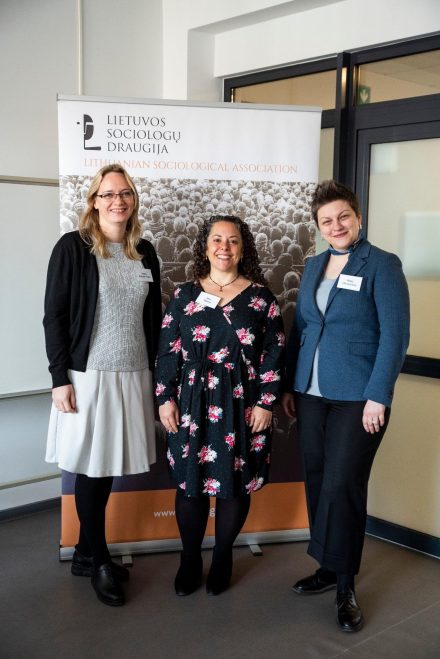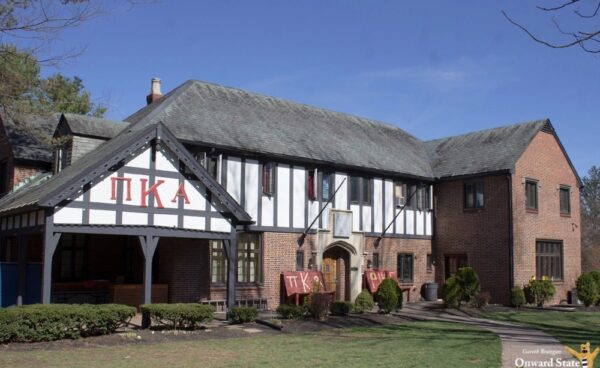Whereas instructing at Elon’s Heart in London this previous semester, Allocco offered her analysis at universities in 4 international locations
Affiliate Professor of Spiritual Research Amy Allocco offered analysis on initiatives she is conducting in South India at conferences and universities in 4 international locations in the course of the Spring 2022 semester.
Whereas serving as school in residence at Elon’s London middle, Allocco was keen to attach with colleagues working in cognate fields at universities within the area and accepted invites by means of the spring to lecture in Lithuania, the Czech Republic, Austria and the UK.
An invite to lecture at SOAS College of London in February supplied the primary alternative to share her analysis. Allocco’s hourlong speak, titled “Enlivening the Goddess and Feeding the Useless,” drew an viewers of school and graduate college students related to the Centre of Yoga Research, which sponsored the lecture, in addition to different students who joined nearly. The lecture targeted on the spectacular pageant of Mayana Kollai (Looting of the Graveyard/Cremation Floor), hosted by a well-liked Hindu Goddess temple in Chennai, South India. It drew on the ethnographic fieldwork that Allocco carried out on the pageant in 2019, 2016 and 2007, and foregrounded the ritual course of, fable, ornament and creativity on this distinctive context. Sabbi Lall, a latest graduate of the graduate program in Traditions of Yoga and Meditation at SOAS, wrote a web-based essay concerning the lecture and Allocco’s feminist anthropological practices. Materials from Allocco’s speak options in a chapter titled “Surprise within the Cremation Floor: The Affective and Transformative Dimensions of an City Tamil Hindu Competition” which is forthcoming in an edited quantity to be revealed by State College of New York Press in 2023.
Following an trade within the question-and-answer interval after her SOAS speak, Lubomír Ondračka of Charles College in Prague, Czech Republic invited Allocco to current at his college. Her April lecture, “Hindu Demise Practices and Ancestor Worship in Tamil South India,” was hosted by Charles College’s Institute of Asian Research and Division of Philosophy and Spiritual Research. In it she supplied an outline of the varied Hindu dying rituals and customs attribute of various communities in Tamil‐talking South India, focusing particularly on invitation rituals designed to deliver deceased kin again into the world to take up residence as everlasting deities of their household’s dwelling shrines. This lecture invitation supplied Allocco the chance to trade with Ondračka and different South Asia research school about her present guide undertaking, “Residing with the Useless in Hindu South India.” As well as, she additionally engaged with graduate college students learning Tamil language on the college in a separate mentoring session.
Later in April, Allocco visited Vytautas Magnus College in Kaunas, Lithuania on the invitation of Milda Ališauskienė, professor within the Division of Sociology and the Division of Political Science. Since 2020, Allocco and Ališauskienė have served as co-coordinators of the Worldwide Affiliation for the Historical past of Religions (IAHR) Girls Students Community however had not been in a position to meet in individual as a result of pandemic. Allocco was invited to supply the opening plenary tackle for Vytautas Magnus College’s Annual Nationwide Convention of Younger Sociologists and Anthropologists in addition to to current a lecture in a International Politics graduate seminar.
Titled, “Anthropology, Human Rights, and Politics: Why and How Do We Analysis and Examine?,” Allocco’s convention plenary took up points associated to the aim of engaged and feminist anthropology, the relationships between citizen and scholar, and the function of public scholarship. Dialogue following her speak centered on the concrete ways in which modern political contexts problem and form scholarly commitments, methodologies, and scholarship itself, notably contemplating the Russian assault on Ukraine.

Throughout her go to to Vytautas Magnus College, Allocco additionally offered “Precarity and Gendered Politics in City South India” in a graduate seminar on International Politics within the Division of Political Science. College students in that seminar learn an article that Allocco not too long ago revealed in “The Journal of Hindu Research,” titled “Vernacular Apply, Gendered Tensions, and Interpretive Ambivalence in Hindu Demise, Deification, and Domestication Narratives.” The dialogue centered on shifting gender roles and expectations in India’s present social and political contexts.
Allocco’s last invited lecture of the semester was sponsored by the Division of South Asian, Tibetan, and Buddhist Research on the College of Vienna in Austria. Her speak, “Drumming and Dialogue: Summoning the Useless in Hindu South India,” targeted on the category of priest-musicians who act as ritual specialists in non-brahminic, vernacular Tamil Hinduism and preside over the ceremonies to influence useless kin to bounce and converse by means of their residing kin and to return dwelling to reside as everlasting family deities that she has been researching. Extra particularly, her presentation analyzed the vary of formality parts—together with verbal and materials ornamentation, communication through flames, and the summoning of the useless from water sources—that these drummers oversee. It additionally highlighted the dialogues with the useless and a variety of deities which can be the centerpiece of those complicated, multi-day ceremonies. Allocco argued for an expanded accounting of modes of Hindu engagement with the divine past what’s presently described within the scholarly literature on Hindu rituals and Hindu dying practices.
As school in residence at Elon’s London middle this semester, Amy Allocco taught a CORE capstone known as “Curried Cultures: Meals and Faith in London.” Taking London as its classroom and specializing in South Asian communities, she invited the scholars in her interdisciplinary capstone to contemplate the relationships between meals, imperialism, and faith. Collectively they sought to know how histories of colonization, migration, multiculturalism and racism have formed meals practices on this context. College students’ readings and analysis had been augmented by course visits to Hindu temples and Sikh “gurudwaras,” meals walks and market visits, visitor lectures, tastings, and collaborative cooking lessons to be taught concerning the lived experiences of London’s South Asian communities and the historical past of culinary interactions between Britain and the Indian subcontinent. College students undertook analysis initiatives with an ethnographic dimension that supplied them the chance to be taught instantly from cooks and others within the restaurant trade in addition to from members of town’s Hindu, Jain, Sikh, Christian and Muslim communities.
